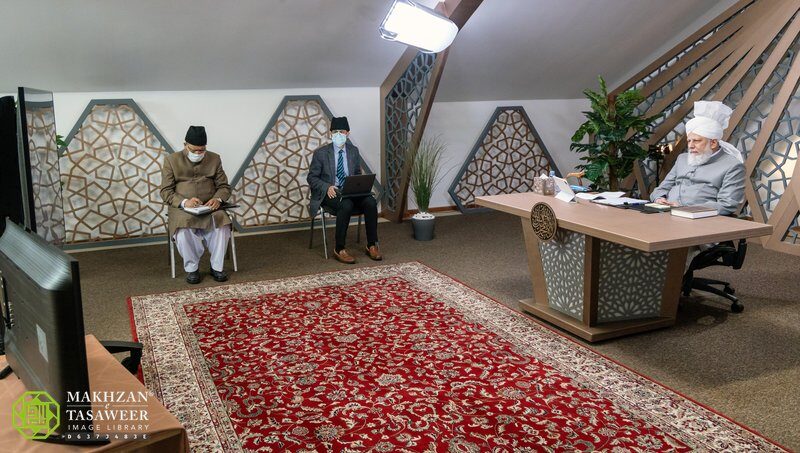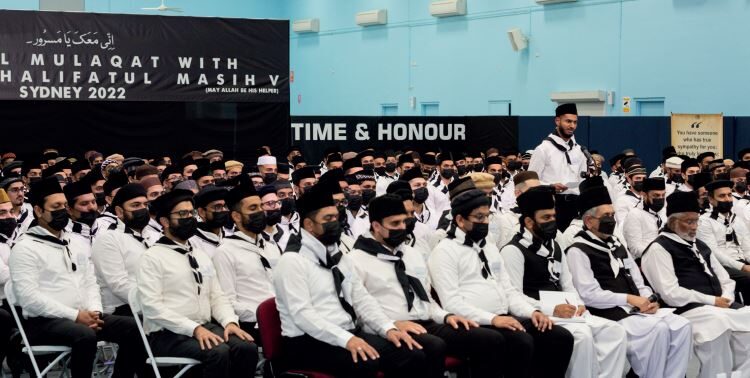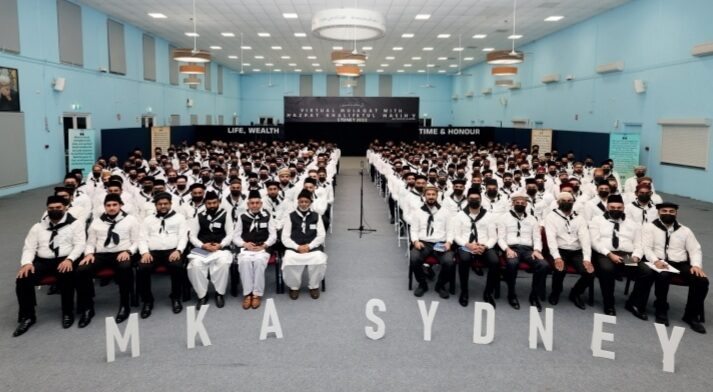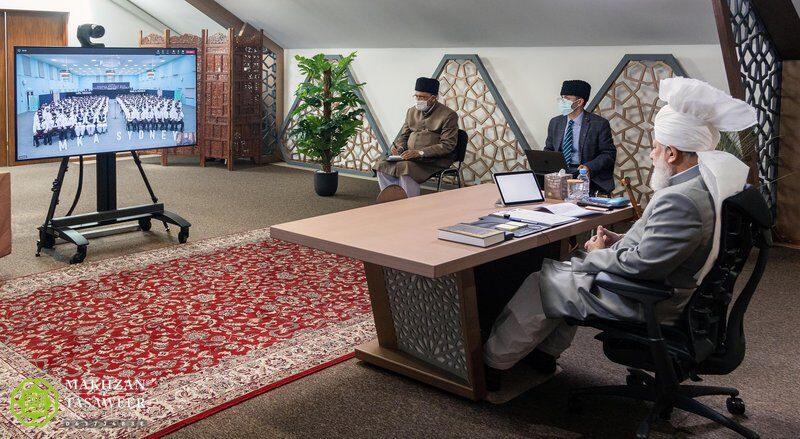
On 26 June 2022, Majlis Khuddam-ul-Ahmadiyya Australia was blessed to have their fourth consecutive virtual mulaqat with Hazrat Khalifatul Masih Vaa. This meeting included 250 khuddam from Sydney (the headquarters of Jamaat-e-Ahmadiyya Australia), as reported by Sadr MKA Australia, Waqas Ahmad Sahib. This was also the second time khuddam from Sydney were meeting Huzooraa through a virtual mulaqat.
Before the formal session started Huzooraa asked about the Covid-19 protocols and the number of khuddam present. After a recitation from the Holy Quran, an Urdu poem, a hadith and an extract from the writings of the Promised Messiahas, a video report about Majlis Khuddam-ul-Ahmadiyya Sydney was played.
Before the floor was opened for the khuddam to ask their questions, Hazrat Amirul Momineenaa referred to a question that was asked in the virtual mulaqat with khuddam from Australia the previous week about the banking system and the permissibility of attaining commission as a loan broker. Huzooraa said many Ahmadi brokers had written to him and said if brokerages were not permissible, they would end their businesses. Huzooraa said this showed their high level of sincerity.
Concerning the permissibility of acquiring commission (as a loan broker), Huzooraa said:
“With regard to getting a commission, as you are not directly involved in taking interest, etc., it is permissible; you are getting the commission. […] The Promised Messiahas has permitted this, for example, money exchanges – the extra commission they take – were labelled as permissible by the Promised Messiahas; it is not interest.”
In the same way, any business in which one was not directly involved with interest was permissible.
Hazrat Khalifatul Masih Vaa explained that modern-day financial and banking systems had been distorted and required fresh Islamic ijtihad.
“For example, a job in a bank – if you begin splitting hairs in this way – then a job at the bank cannot be permitted either.
“Then, the whole modern-day industry and businesses follow an economic system that is all based on interest.” If one was to avoid modern-day business and industry altogether, “then you wouldn’t even be able to wear clothes and would need to cover yourself with leaves”, Huzooraa said.
Hazrat Amirul Momineenaa explained that the Promised Messiahas had made it clear that the modern-day system had been totally distorted and many elements had been absorbed into the interest-based financial system – therefore one could not avoid it altogether and ultimately new Islamic ijtihad was required.

Huzooraa narrated that once, someone asked the Promised Messiahas if the job they had, which was to check if alcohol sellers had an official licence to sell, was permissible. The Promised Messiahas said the person was just carrying out his job, not selling the alcohol himself – his task was just to check the license and therefore it was permissible. The Promised Messiahas said to him that if he could get a job better than this, in which there was no involvement at all, it would be better.
Hazrat Amirul Momineenaa narrated another incident:
“In fact, someone asked Hazrat Khalifatul Masih II[ra] that ‘I work for a person who has a business of giving interest – he gives loans based on interest – and I keep records of the interest etc. Is this permissible?’ Hazrat Khalifatul Masih II[ra] said ‘That’s okay, you are doing a job. It is permissible for you.’”
Concluding the issue, Huzooraa said:
“The question about brokerage and commission agents – it is permissible. If you are taking interest from someone, that is impermissible.
“This isn’t just happening in Australia, it is taking place all around the world. So you are allowed to be a commission agent as you are taking a price for your service.”
With regard to those brokers who take advantage of people who require a loan but do not acquire it directly, Huzooraa said:
“At times, there are some who are helpless and in need of a loan and the lending agencies, who provide the loans, do not give it. The broker gets them the loan and – seeing that they are in need, if his fee is 100 rupees, or £100 or $100 – he instead takes $500 or $1,000. One should not take advantage in such a way. Yes, to help, the fees you have already set, keep those. It should not be that on seeing someone who is in need you begin to charge them extra.
“Apart from this, the profession of brokers is permissible.”
The khuddam then had a chance to ask Huzooraa any questions they had.
Omer Farooq Sahib from Mount Druitt asked if Allah would create universes after the end of this one and whether other universes existed.
Huzooraa replied by saying:
“Yes, there are quite a number of universes; in fact, there are millions of universes. Even the Promised Messiahas has written that there are quite a number of universes and we don’t know – we don’t have access to those universes as yet. But there are quite a number of universes and galaxies.”
Syed Atta ul Hayye Sharifi Sahib asked Huzooraa how one could face failure and escape despair.
Huzooraa answered the question by quoting a couplet of Hazrat Nawab Mubaraka Begumra, daughter of Hazrat Mirza Ghulam Ahmadas:
مایوس و غم زدہ كوئى اس كے سوا نہیں
قبضے میں جس كے قبضۂ سیفِ خدا نہیں
“‘Who else could be more disappointed and disheartened; than one who has no grip on the grip of Allah’s sword.’
“Keep Allah the Almighty’s sword in your hand. You must know with certainty that Allah exists, that Allah listens to prayers, and that the situation Allah is taking you through could be a small and temporary trial or test which you must go through. And after passing this test, Allah the Almighty will then bestow success. A person should be praying to Allah, all the while believing that Allah listens to prayers.

“It is a natural phenomenon that a person develops feelings of despair – there is a psychological effect too. But in such a condition, getting desperate to such an extent that you give up all hope and sit at home or lock yourself in a room and get depressed, is wrong. At such a time, one must pull themselves together and use their willpower and pray before Allah the Almighty.
“And if the depression reaches a critical level, then one should go to the doctor and seek medical treatment. This condition would be classified as an illness. Then one should treat it as an illness and take medicine so that one can escape depression.
“Otherwise, bow before Allah, pray to Him, remember Him and try to come out of such a phase.
“Allah the Almighty says in the Holy Quran:
اَلَا بِذِكۡرِ اللّٰہِ تَطۡمَئِنُّ الۡقُلُوۡبُ
“That remember Allah constantly; in turn, your hearts will find comfort. For this, one must show fortitude, use willpower and face the truth as it is – face it courageously.
“There is no other solution to this; the only remedy is willpower, prayer, effort and hard work towards whatever endeavour there is a lapse in.
“It’s normal that a person doesn’t see success in a particular goal, but it could be that they see success in another. Sometimes they don’t see success for a long period and they go through a trial. But then again, without God, there is no other way either”
Huzooraa gave the example of an ascetic who would sit and announce, “Allah, I don’t like your world”. Hazrat Hakim Maulvi Nuruddin, Khalifatul Masih Ira would listen to this call every day whenever he passed him. One day, he went past that man and didn’t hear him repeat those words. Surprised, Hazrat Khalifatul Masih Ira asked the ascetic why he went silent. He replied that he had received his answer from God, which was, “Okay, then leave and go to a world which you like.”
With a smile, Huzooraa emphasised that this world was the one which we had to live in and endure, therefore one should brave trying times in a corageous manner and show fortitude.
Abdal Chughtai Sahib from Plumpton said that some people achieved great success with little effort while others exerted a lot of effort but still struggled. He asked Huzooraa how one could know if failure was due to a lack of effort or destiny.
Hazrat Amirul Momineenaa said we could not tell how much effort others carried out – all we knew was what effort we carried out personally. Huzooraa recognised that some people did have special talents, qualities and aptitudes; however, “normal people are average and they take time to learn something or to complete their assignments. […] Normal people, as I have said, take time and the majority of them are normal, average persons.”
Talking about effort and hard work, Huzooraa said:
“Instead of seeing what the other man has done, you should make your proper effort. In every achievement, you will have to work hard. If you are working hard, you will achieve your goal and Allah the Almighty will also help you.
“And at the same time, being a Muslim, being a strong and staunch Muslim, being an Ahmadi, when you work hard you [must] also pray to Allah the Almighty that Allah helps you to complete this assignment, this goal and make it easy for you. In this way, Allah will also help you and you will achieve your target in less time or with less effort, or in a better way.”
Naveed Ahmad Sahib from Penrith said most of the khuddam in Australia had grown up in Australia or had migrated from the Indian subcontinent. He said that at times, there was a cultural gap in carrying out tasks between those khuddam who had grown up in Australia and those who had migrated from the subcontinent. Naveed Sahib asked Huzooraa how one could tackle this situation.
Hazrat Khalifatul Masihaa said:
“Those who have grown up [in Australia] have a different mindset – their environment was different where they were brought up. But there are quite a number of khuddam in recent years who have migrated from Pakistan or some other countries. There are some migrants from Fiji also, so they have almost the same culture as those who are brought up here in Australia. The only difference is between Pakistani and other non-Pakistanis who were brought up here in Australia or any other Western country.
“You see, this is why I have always been saying that your parents should at least try to train their children from the very childhood. Tell them who they are, what the importance of religion is and why they are Ahmadi Muslims; why they should offer five daily prayers; why we should read the Holy Quran and find out the commandments given in the Holy Quran; why we should practice those commandments and injunctions.
“So, in this way, the children will know that what are our duties, who we are, why we should follow [Islam Ahmadiyyat]. Then, if they are brought up even in this culture, in this society, then they will be able to differentiate between good and bad. They will know that these are the bad things, these are the bad morals which the modern societies and culture allow – or the Western culture allows – but Islam prohibits.
“There are certain things; for instance, Islam says to the men that you should always lower your gaze, you should not openly see the women, you should not try to enjoy something which is bad morally. And at the same time, Islam says to the girls that they should also lower their gaze and cover their faces so that their beauty cannot be freely seen by their opposite sex. […]
“We shall have to teach them from the very childhood – this is the duty of the parents and this is the duty of Khuddam-ul-Ahmadiyya and Atfal-ul-Ahmadiyya – tell them, ‘these are the good things, these are the bad things, these are the things which Allah the Almighty does not like, these are the things which have been taught to us which we should refrain from.
“It needs some hard work. Not only Khuddam-ul-Ahmadiyya but parents should also be involved in it and they should be educated by Ansarullah, Khuddam-ul-Ahmadiyya and Lajna, that how can they train their children in their houses, in their homes.
“It’s quite a difficult task, but you will have to face this challenge – you will have to work hard. […]
“From the very childhood, we have to infuse this into the minds of the children that we shall have to follow the teaching of Islam and we shall have to learn the morals which have been taught by Allah the Almighty and Islamic teaching.”
Raza Mohamad Sahib from Blacktown asked, “We know that Khulafa are chosen by Allah; how can we prove this to non-Ahmadis when they say our Khalifa is chosen by humans?”

Hazrat Khalifatul Masih Vaa said:
“Allah the Almighty uses human beings [as instruments] and Allah puts it in the hearts of the people. There are quite a number of members of the electoral college who elect the Khalifa that they didn’t know – even in my election, I was not known to everybody, I think not more than five per cent of people had the knowledge about me – and even there were some Arabs, and some foreigners, some Africans, they say suddenly something happened that Allah put in their hearts that you should try to raise your hand in favour of this person.
“Although human beings or the people choose the person, it is Allah the Almighty who puts it in their heart and there are quite a good number of narrations and expressions of different people – those who have expressed how did they feel during the election and what happened. […]
“Increase your knowledge first, then you can satisfy your non-Ahmadi friends or even your own fellow khuddam members. There are quite a number of khuddam who are also not very much clear about it – they have some doubts in their minds – so you will have to remove their doubts. The first thing [to do is] read, and then remove their doubts.”
Referring to the early history of Islam and how the Khulafa were elected, Huzooraa said:
“Sometimes Allah the Almighty Himself appoints somebody as prophets, sometimes it is through some people. And that is what we see in the history of Islam. Who chose Hazrat Abu Bakrra? There was a conflict between Ansar and Muhajirin – those who wanted to choose their Khalifa from their own tribes, from their own nation. Ansar were saying that ‘we shall choose our Khalifa from among Ansar’ – Muhajirin were saying ‘no, we shall choose our Khalifa from amongst Muhajirin’. Then Hazrat Umarra spoke, Hazrat Abu Bakrra spoke on this issue and later on they amicably came to the conclusion that ‘okay, we shall do the bai‘at of Hazrat Abu Bakr’.
“The same thing happened during the election of Hazrat Umarra – and this is in Islamic history and that is being followed here in our system.”
Huzooraa emphasised, “We have not adopted a new system, we are following the same old system. If it is for non-Ahmadi Muslims, you can tell them Hazrat Abu Bakrra, Hazrat Uthmanra, Hazrat Alira, Hazrat Umarra were chosen Khulafa; they were all chosen by human beings. In the same way, the Khulafa of Ahmadiyyat are chosen.”
Huzooraa said that if one was to explain this concept to non-Muslims, for example, Christians, then they could be told about the experiences of those who were part of the electoral college and how Allah guided their hearts. Hazrat Amirul Momineenaa said:
“This is how Allah Almighty’s decree works. This is the decree of Allah and He puts [it] in the hearts of people.”
Tasleem Ahmad Fateh Sahib from Parramatta said that the Holy Prophetsa was fond of using perfume and asked Huzooraa if he had a favourite perfume.
Huzooraa smiled and said:
“[The Holy Prophetsa] was fond of using perfume, yes. He said, ‘I like the good smell and perfume’, yes. And I also like perfumes and there are quite a number of perfumes which are my favourite – especially oud, I like […] There are some Arab perfumes and some Western perfumes, so whichever has a good smell, I like it.”
Huzooraa then lovingly asked Tasleem Sahib which perfume he liked, to which Tasleem Sahib said he used whatever his wife bought for him and was available.
Ammar Ahmad Tahir Sahib from Penrith asked if one could turn down a new responsibility given to them in the Jamaat as they already had another and thought they would not be able to do justice to the new one.
Huzooraa said one could express that they already had a responsibility in the Jamaat and might not be able to do justice to the new one. However, if one had a responsibility in Khuddam-ul-Ahmadiyya but was elected as an office-bearer or given another responsibility in the Jamaat, then the Jamaat would be given preference. Huzooraa said if one could continue both it was all well and good; however, the first preference would always be the Jamaat responsibility and the second an auxiliary responsibility.
Umair Shams Sahib from Campbelltown said there was a growing trend amongst some Ahmadis with children who decorated their homes during Ramadan and made Eid count-down calendars for their, etc. They would then post this on social media. Umair Sahib asked Huzooraa about the matter.
Hazrat Khalifatul Masih Vaa said:
“The Holy Prophetsa said
إِنَّمَا الأَعْمَالُ بِالنِّيَّاتِ
“Your every work and deed depends on your intention. What is the intention behind it? If they are decorating their homes during Ramadan to let their children understand the importance of Ramadan, then there’s no harm in it. If they have made the calendar and their countdown of Ramadan’s fasting days […] just to tell them that now ‘this is the first, second, third, fourth fast etc. and after 29 or 30 days we shall celebrate Eid which is very important’ […] Children will ask ‘what is the importance of Eid’ and you can tell them what the Holy Prophetsa said, that we should attend the Eid prayer […]they should even go to the mosque and listen to the Eid sermons – they can sit outside the mosque even. […]
“When they are counting down, you can tell them what is fasting – why there are 30 fasts in Islam and what is a fast? […]
“So, if this is the intention, that you introduce about Ramadan and about Eid, then there is no harm in it. If it is just to copy that ‘because Christians are doing it, we should also do it’, and you do not tell them about the history of fasting and the importance of fasting and the importance of Eid, then it is wrong.
“There’s a subtle difference; you yourself have to find out. You cannot just say that ‘this person has done this thing because of bad intention’ – if the person says ‘my intention was good’ then we have no right to say ‘no, you are wrong, I know that your intention was not good’. You are not God. Allah knows better. Don’t be rigid.”
Nayyar Ahmed Sahib from Blacktown said the coronavirus pandemic arrived so that people would draw closer to their true Creator. He also asked if a greater trial for humanity would come if reformation had not occurred after the coronavirus.
Hazrat Khalifatul Masihaa asked, “Have you received some dream or divine revelation that the coronavirus pandemic emerged so that people got closer to their true Creator? I didn’t know about this.” Nayyar Sahib said that he had not.
Huzoorra continued:
“Yes, when any illness that arrives, any pandemic that spreads, any hardship that manifests, those who bow before Allah the Almighty realise that these things have arrived and they should get closer to Allah, get closer to their Creator and bow before Him, and pray to be protected from these worries, hardships and pain. This is in general.
“In the same way, [the coronavirus pandemic] arrived and this was a pandemic that spread across the world. Those who were righteous, had a pure nature and had a religious bent, turned towards Allah the Almighty. Those who were not, did not turn to Him.
“Some who did not pay attention to God before, turned to Him as well, even in Western, non-Muslim countries.”
Huzooraa said a lot of people just took the pandemic to be a normal illness and that it came and would pass. They thought it to be like the flu and didn’t care if they died or not. Huzooraa asked how such people could reform themselves?
Huzooraa said natural disasters like bush fires, earthquakes and floods continued to come but still people did not pay attention to Allah – it did not matter if it was Covid-19 or anything else. Those who did not pay attention to Allah cared not if it was Covid-19 or another disaster, they didn’t fear Allah.
Hazrat Khalifatul Masihaa said one should carry out istighfar on the arrival of every disaster and seek Allah’s refuge and said Ahmadis should take advantage of such times and carry out more tabligh.
“When such conditions arrive, it is our duty to tell them that this all happened because we are drawing further away from Allah the Almighty.”
Arun Ahmad Aggarwal Sahib from Parramatta asked Huzooraa about the current situation in India around certain blasphemous statements and how Muslims should respond.
Huzooraa asked Arun Sahib if he was originally from India, to which he replied in the affirmative. Huzooraa explained that Muslims should respond and react to such situations in a way that was useful and not counterproductive.
Huzooraa said Ahmadis were responding by writing in newspapers and educating people about the reality of Islam, the Holy Prophetsa and Hazrat Aishara.
“On social media and in newspapers and other platforms, we are doing our best to explain to the people and also to remove the doubts of the non-Muslims and quite a number of non-Muslims agree with our point of view, our stance and they accept it.”
Huzooraa stressed Muslims should not clash and riot as it would ultimately only harm them.
At the end of the mulaqat, Sadr Khuddam-ul-Ahmadiyya Australia, Waqas Ahmad Sahib thanked Hazrat Amirul Momineenaa for granting MKA Australia four consecutive virtual mulaqats and expressed how the khuddam in Australia benefitted both spiritually and intellectually.
Hazrat Khalifatul Masihaa ended by saying, “Allah the Almighty bless you all” and conveyed his salaam, after which the meeting came to a close.
At the start of the meeting the following khuddam had the opportunity to present before Huzooraa:
• Ihtesham Ahmad Sahib recited a portion from the Holy Quran and Rizwan Sharif Sahib presented its English translation
• Abdal Ahmad Sahib recited an Urdu poem written by the Promised Messiahas
• Sahil Ahmad Malik Sahib presented a hadith of the Holy Prophetsa in Arabic and the English translation was read out by Asad Ali Malik Sahib
• An Urdu extract from the writings of the Promised Messiahas was then read out by Aneeq Ahmad Sahib and its English was presented by Khakan Ahmad Sahib
(Report prepared by Al Hakam)

